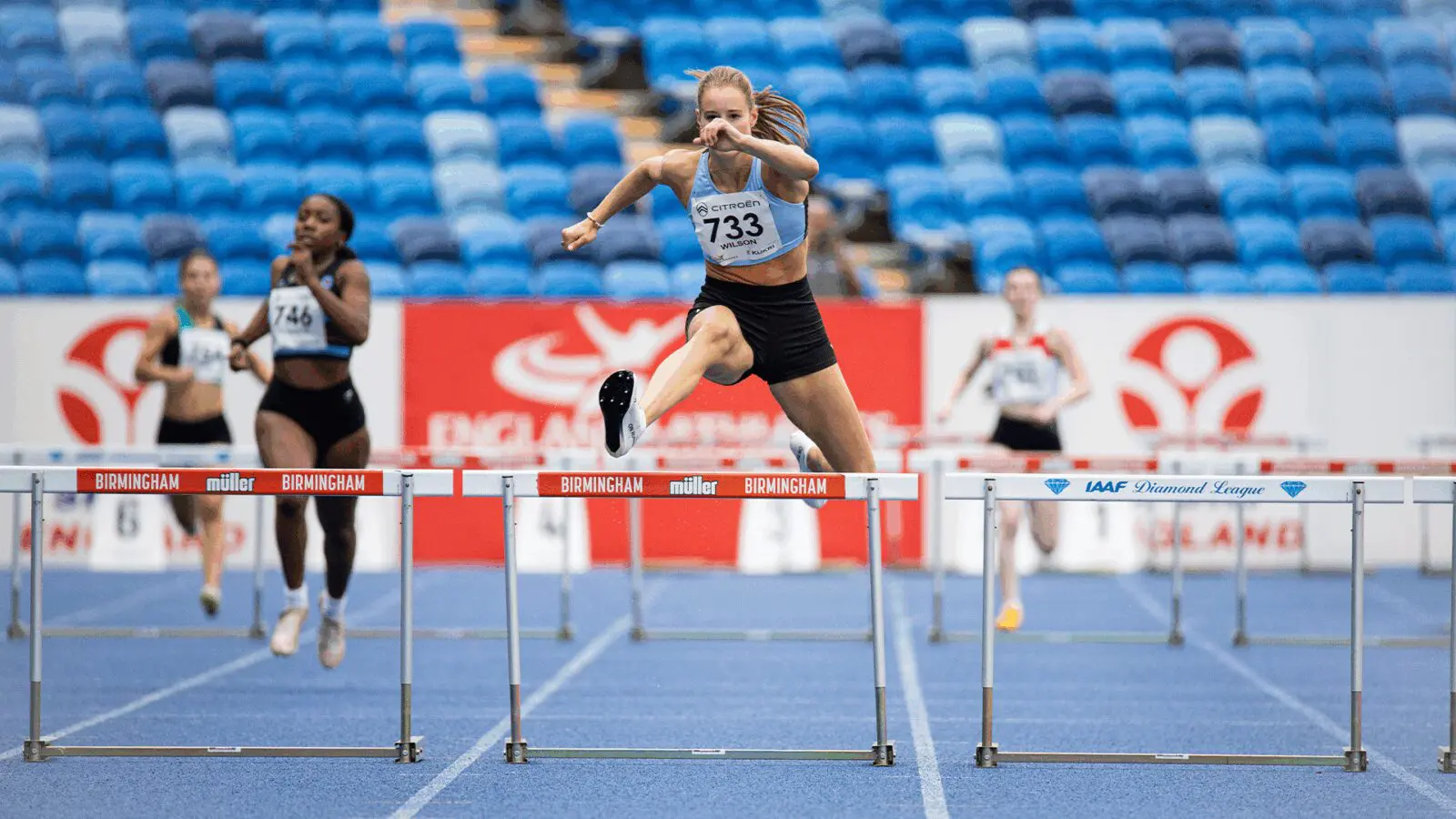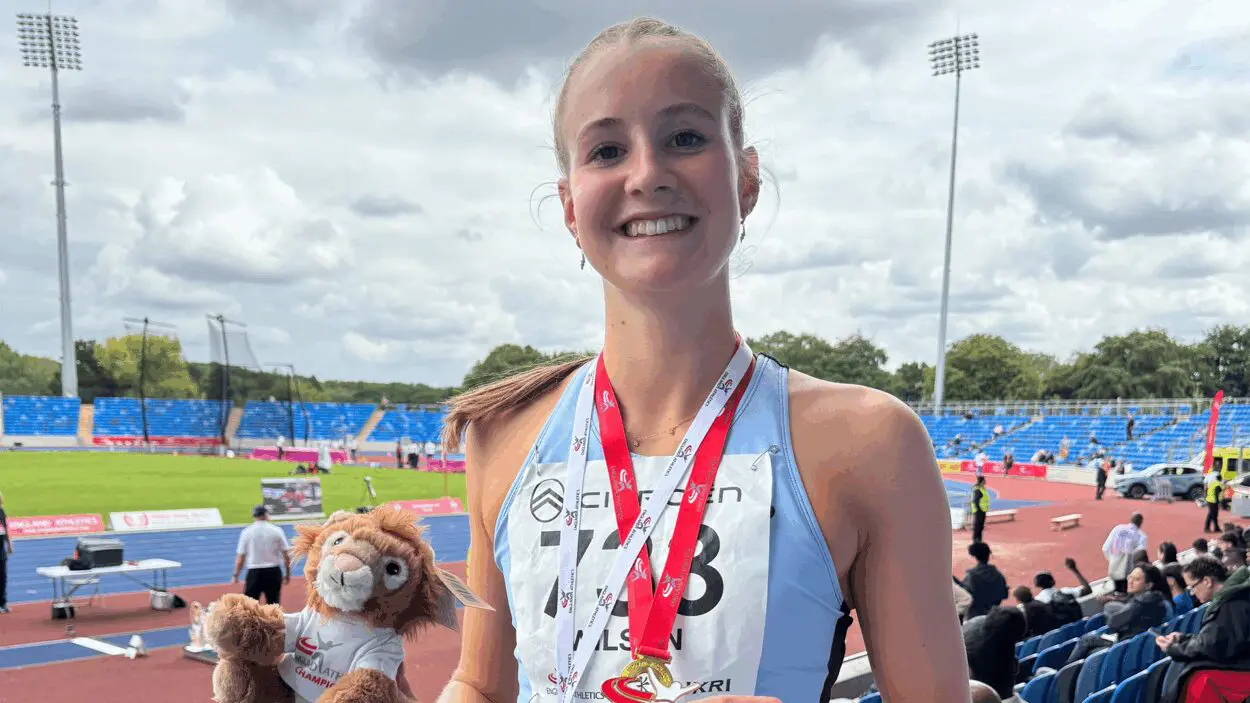Before becoming the world heptathlon champion, American Anna Hall made her mark in the 400m hurdles. Now taking a similar route is British teenager Arabella Wilson.
A standout over the 400m hurdles, Wilson placed fourth in the UK senior rankings this year with a PB of 57.34, set while finishing fifth at the European U20 Championships in Tampere.
She’s the only female athlete to have ever won all four long hurdles titles across English Schools and SIAB. On top of that, she broke the UK U20 300m hurdles record this summer [41.05] and still holds the fastest 400m hurdles time ever recorded by a British 15-year-old.
Though a navicular stress fracture in early 2023 paused her progress in the heptathlon, Wilson has recently moved to Duke University in the US, where she is set to continue developing in both the combined events and the 400m hurdles.
How did you first get into athletics?
I've always been very interested in sports. In Guildford, where I grew up, I was part of the Young Athletes Club – a club for athletes under the age of 13 run by two amazing people.
But it was my primary school teacher who noticed I might actually be quite good at athletics. When I was in Year Five, she started giving me some coaching outside of school and helped me qualify for the National Prep Schools competition.
I remember saying to my mum: “If I make the final of the 100m, can I get my ears pierced?” I didn’t think I’d make the final, so I thought she’d say yes, and she did. Then I made the final, which was a cool experience. Until that point, I’d been doing a lot of cross-country, and then I realised I was actually quite good at sprinting, too.

What is your relationship with the heptathlon like?
My first love in athletics was always the heptathlon. I remember watching Jessica Ennis-Hill at the 2012 Olympics and thinking: “Wow, that is so cool, I want to do that.” I read her autobiography and always thought: “I really think I can be good at this. I want to have a go.”
I did well when I was younger but, in the summer of 2023, I got a stress fracture in my navicular, which was awful. I had qualified to represent Team England at the Commonwealth Youth Games in Trinidad and Tobago which was going to be my first big international competition but I had to make the difficult decision to pull out. I think it was the right decision.
How did you fall into the 400m hurdles?
I had already decided I wanted to try the 400m hurdles by the time of my injury, and afterwards I never quite got back to the same level in multi-events. The training load for the heptathlon is so intense, and the pressure on my foot made it hard to return.
I really found that I loved the 400m hurdles and was pretty good at it, so we decided to focus on that for the summers of 2023, 2024 and 2025. I did do one heptathlon this year, though, and now I’m primarily training as a heptathlete again at university. I feel like I have so much untapped potential in the event and want to see how far I can get.
I’m also going to continue with the 400m hurdles. I want to see how far I can go with both, and maybe eventually I’ll have to choose one, but for now they complement each other well. The 400m hurdles is a brutal event, but so is the heptathlon.
What was your European U20 Championships experience like?
Just getting there felt like an achievement, but I knew I was in good shape after a solid winter training season. My mindset was to give it everything, I had nothing to lose. There was no guarantee I’d make the semi-final or the final, but I gave it my best in every race.
Being on the track with the best in Europe, some of whom I’d only seen online, was amazing. Being in contention with them felt surreal.
Looking back, I could have won a bronze medal. It was that close. But I was super happy to come fifth with a small PB. It was the first time I’d run a heat, semi, and final, and I learned a lot about managing tiredness.

How are you finding training in the US?
It’s been overwhelming at times, living on the other side of the world from my family, adjusting to American culture, but I’m embracing it. My training group is lovely, the coaches are amazing, and they’ve made me feel really welcome.
What’s always been important to me is continuing with my academics. I know I can’t be an athlete forever. I want to get a job one day, and I want to go as far as I can academically.
One of the key factors in choosing the US was the opportunity to get my degree and to train almost like a professional athlete - in both the 400m and heptathlon in the same group. That combination wouldn't have been possible at a university in the UK.
The campus at Duke is stunning, the track is surrounded by massive trees, and it feels like a home away from home.
Who do you look up to?
In the 400m hurdles, I’m massively inspired by Sydney McLaughlin-Levrone. What she’s done has redefined what people thought was possible, not just in the hurdles but in the 400m too.
In terms of British athletes, Jessie Knight has also inspired me and as I mentioned earlier, Jessica Ennis-Hill has been my main idol since I was young. Someone who’s been especially important in the last couple of years is Niamh Emerson. She’s had a very difficult time with injuries, she actually had the same injury as me. I reached out to her, and we’ve been in contact since. She’s offered advice and perspective, which has been incredibly helpful.
If you could go back to your younger self when you first started this journey, what would you tell her?
I’d say: “Try everything. You never know what you’re going to be good at. Don’t limit yourself. Embrace every opportunity. You might get injured, anything can happen, so make sure you always give 100 per cent to everything you do. Nothing can take away from hard work”.
